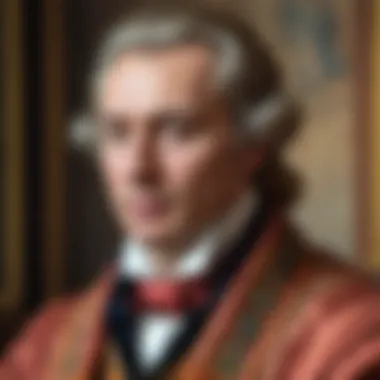Eighteenth Century Russian Writers: An In-Depth Review


Intro
The eighteenth century is a pivotal period in Russian literature, marked by shifts in both thought and style. This era witnessed the emergence of a diverse group of authors who laid the groundwork for the Russian literary tradition. Their works reflect the cultural, social, and political changes of the time, often responding to the influences of Western Europe while remaining distinctly Russian. This overview will explore key writers, their significant contributions, and the genres that dominated the landscape.
Основные жанры литературы
Eighteenth-century Russian literature is characterized by a range of genres that illustrate the evolution of literary expression during this time. Authors experimented with different forms, from poetry and drama to prose and satire. The following subsections provide insights into the classification of these genres and the unique features of each one.
Классификация по жанрам
- Poetry: Focused on emotions, nature, and society, poetry flourished under the influence of European models. Notable figures like Mikhail Lomonosov contributed to its development, exploring themes that resonated deeply with the Russian populace.
- Prose: Prose saw significant growth, with writers like Alexander Sumarokov and Nikolai Karamzin shaping the narrative style. Works of fiction began to emerge, reflecting both the imaginary and real lives of individuals.
- Drama: The dramatic arts gained prominence, inspired by Western theater. Playwrights like Denis Fonvizin introduced a new wave of comedy, addressing moral and social issues.
- Satire: This genre served as a critical tool to examine the absurdities of life. Writers such as Vasily Trediakovsky used humor to critique societal norms and politics.
Особенности каждого жанра
- Poetry: Characterized by a strict form, Russian poetry often employed elements such as rhyme and meter, influenced by classical works. Themes included love, nature, and patriotism, displaying the poet's emotional depth and cultural consciousness.
- Prose: Eighteen-century prose varied from historical narratives to personal reflections. Many authors employed a straightforward style, providing clarity and accessibility for readers. This genre often blended autobiographical elements with fictional storytelling.
- Drama: Eighteenth-century Russian drama bridged the gap between comedy and tragedy. Themes of morality and societal critique were common, reflecting the complexities of human behavior amidst changing times.
- Satire: Rich in humor and wit, satire was not only entertaining but also educational. Writers used irony to address pressing issues, encouraging societal reflection and critique.
This era of literary experimentation set the stage for future developments, blending native traditions with European influences.
Рецензии на книги
In this section, we will delve into some of the popular works and authors of the eighteenth century. The analysis of these texts will reveal their significance within the broader literary context.
Обзор популярных книг
- "Poor Liza" by Nikolai Karamzin: A poignant story of lost love and social disparity, it resonates with the universal theme of tragedy intertwined with nature and human emotion.
- "The Minor" by Denis Fonvizin: A satirical play that critiques the moral weaknesses of Russian society, showcasing the playwright's skill in comedic storytelling.
- "The Tale of Tsar Saltan" by Alexander Pushkin: Although it bursts into popularity later, its roots can be traced back to the classic elements of eighteenth-century storytelling.
Анализ литературных произведений
The works of these authors demonstrate the transformation of Russian literature. Karamzin's style reflects emotional depth, while Fonvizin's plays highlight social critique through humor. These narratives not only entertained but also prompted contemplation on the essence of human experience.
Understanding the contributions of these writers provides insight into how literature can mirror societal dynamics and cultural shifts. Each genre and work from this era contributes to the rich fabric of Russian literary history.
Prolusion to Eighteenth Century Russian Literature
Eighteenth century Russian literature holds a distinctive place in the broader context of literary history. This period witnessed a foundational shift in literary expression, marked by a quest for new styles and themes. Understanding this transformation allows readers to appreciate how earlier traditions set the stage for the monumental literary movements of the nineteenth century.
The writers of this era navigated complex socio-political landscapes. Their works often reflected the changing dynamics within Russian society. Analyzing these texts provides insights into the views and sentiments of their time, particularly in relation to governance, morality, and cultural identity.
Historical Context
The historical context of the eighteenth century is crucial for comprehending the literature produced during this time. Russia was undergoing significant changes under the influence of Western Europe. Peter the Great's reforms modernized the state, promoting education and the arts. Writers began embracing new ideas, often inspired by Enlightenment thinkers. These shifts led to a blossoming of cultural and intellectual life in Russia, paving the way for literary experimentation.
At the same time, the rigid social structures and class distinctions remained prevalent. Writers had to navigate these societal constraints, often reflecting them in their works. The tension between tradition and modernity is a recurrent theme, as authors like Mikhail Lomonosov and Denis Fonvizin grappled with evolving societal norms and expectations.
Cultural Influences
Cultural influences played a significant role in shaping the literary output of this century. The influx of Western ideas brought with it a variety of literary forms and styles. This time also saw the establishment of Russian theater, influenced by French and Italian traditions. The arrival of new genres, such as satire and the novel, can be traced back to these interactions.
Moreover, the Russian Orthodox Church's influence remained strong, often intermingling with secular themes in literature. This complex interplay of religious and secular thought created a rich tapestry, influencing how writers approached moral and ethical questions. Themes of duty, honor, and societal critique became prominent, reflecting the authors' struggles with their cultural identities and roles within society.
Key Russian Writers of the Eighteenth Century
The eighteenth century plays a vital role in the evolution of Russian literature. It marks the transition from early literary works influenced by foreign cultures to a unique Russian voice. The writers of this period crafted stories and poems that mirrored societal shifts, historical changes, and cultural transformations. Understanding these key figures is essential to grasp how they laid the foundation for future literary movements and created a platform for new ideas.
Alexander Sumarokov


Biographical Overview
Alexander Sumarokov was born in 1717 and is often recognized as the father of Russian drama. He is notable for his contributions to both poetry and theater. Sumarokov’s life was characterized by his struggle between noble aspirations and the artistic limitations imposed by an at times unappreciative society. His experiences shaped his works, which often reflect a blend of personal emotion and broader societal themes. This backstory makes his biographical overview an interesting exploration of the relationship between his life and writings.
Major Works and Themes
Sumarokov's major works include "Khorev" and "Medea." These plays combine elements of tragedy and drama. He focuses on themes like morality, justice, and the human condition. His depiction of characters often highlights moral dilemmas faced by individuals in a rapidly changing society. This thematic richness makes his work compelling as it engages with both personal emotions and societal issues, offering a holistic view of the human experience.
Literary Impact
The literary impact of Sumarokov is significant. He influenced later playwrights, including Denis Fonvizin and others who followed. His emphasis on drama as a vehicle for social critique paved the way for modern Russian theater. His attempts to create a distinct Russian identity within literature also resonate through time, marking him as a cornerstone in Russian literary history.
Mikhail Lomonosov
Contributions to Poetry and Science
Mikhail Lomonosov stands out as a polymath in Russian history, combining a passion for both the arts and the sciences. His contributions to poetry are vast, highlighted in works like "The Odes to the Empress Elizabeth." Lomonosov’s poetry reflects the Enlightenment ideals, showcasing a blend of passion and intellect. His role in establishing the Russian language for scientific discourse makes his contributions doubly important.
Notable Works
Among his notable works, one can find "The Constellation of the Heavenly Bodies" and various odes that celebrate Russia’s natural beauty. These works not only highlight his versatility but also explore themes of nature, patriotism, and the human experience. His poetic language is recognized for its depth and lyricism, which enhances his appeal in both literary and scientific communities.
Legacy and Influence
Lomonosov’s legacy is profound. His influence extends beyond poetry to the development of the Russian language itself. His blending of scientific thought with poetic creativity set a standard that echoed through the centuries, inspiring generations of writers and scholars. His multidisciplinary approach remains an important reference in discussions about the interconnectedness of literature and science.
Denis Fonvizin
Life and Career
Denis Fonvizin, born in 1745, is regarded as one of the most significant playwrights of his era. His career was marked by a commitment to sharp social critique and a focus on the idiosyncrasies of Russian society. Fonvizin’s life reflects the tension between personal beliefs and the political climate of his time, making his career a study in resilience. Understanding his journey provides insight into the broader cultural landscape of eighteenth-century Russia.
Significant Plays
Fonvizin’s plays, such as "The Minor" and "Nedorosl'" are powerful examples of social satire. They explore themes related to education, class dynamics, and moral hypocrisy. His characters often serve as a mirror to society, exposing flaws and weaknesses. The significance of these plays lies in their ability to challenge societal norms while engaging audiences through humor and wit.
Social Commentary
Fonvizin's social commentary provides a critical lens on the issues of his time, including issues of social class and education. His sharp observations and clever dialogues provoke reflection on the status quo, making his work highly relevant. The impact of his commentary echoes through subsequent works, influencing later writers and playwrights who aim to address similar themes in their narratives.
Grigorii Kvitka-Osnovianenko
Overview of Works
Grigorii Kvitka-Osnovianenko, active during the late 18th century, is notable for his contribution to the development of the Russian comedy. His works often celebrate the everyday experiences of ordinary people. By focusing on the lives of peasants, Kvitka-Osnovianenko created a connection with the common man, making his narratives relatable and poignant.
Exploration of Themes
His exploration of themes like social class, humor, and the human condition set Kvitka-Osnovianenko apart as a pivotal figure in Russian literature. His stories reveal the struggles and triumphs of common life, highlighting the rich tapestry of Russian society. This thematic focus not only entertains but also enlightens readers about the cultural dynamics of his time.
Influence on Later Literature
The influence of Kvitka-Osnovianenko on later literature is profound. He paved the way for comic literature in Russia, inspiring writers who sought to challenge societal norms through humor. His works continue to be a reference point for understanding the evolution of Russian comedy and its significance in Russian literature.
Nikolai Karamzin


Biographical Insights
Nikolai Karamzin, born in 1766, is often characterized as the father of Russian sentimentalism. His life was marked by personal tragedies that shaped his literary voice. Understanding Karamzin's background allows for an appreciation of the emotional depth found in his works. His sensitivity toward the human experience resonates through his writing.
Major Literary Contributions
Karamzin's major literary contributions include his novels like "Poor Liza" and essays that reflect on the needs of the individual in society. His works often emphasize emotion over reason, advocating for a deeper understanding of the human condition. This focus on sentiment laid the groundwork for the development of future literary movements in Russia.
Impact on Russian Sentimentalism
The impact of Karamzin on Russian sentimentalism is substantial. His emotional narratives and focus on individual experience were revolutionary for his time, influencing countless writers who came after him. His legacy can be seen in the works of authors like Pushkin and Turgenev, showing the lasting effects of his literary ideology.
Literary Developments During the Eighteenth Century
The eighteenth century was a transformative period for Russian literature. It marked the emergence of new genres and changes in writing styles that reflected the complexities of Russian society at the time. As authors navigated through the influence of Western thought and domestic realities, they became notable figures in sculpting the literary landscape.
Key aspects include the evolution of prose and poetry as distinct forms, alongside the significant role of drama. Each genre added unique perspectives and contributed to the richness of literature during this time.
Emergence of New Genres
Prose versus Poetry
In the eighteenth century, the divergence between prose and poetry began to reshape the literary world. Prose became a preferred choice for many authors. Its straightforward nature allowed writers to discuss complex social issues and philosophical ideas more clearly. This clarity was paramount for engaging readers who were transitioning from traditional forms of literature to newer styles.
Key characteristics of prose included its narrative flexibility and ability to delve into intricate character development. Such traits made prose a beneficial medium for authors aiming to convey detailed stories or critiques of society. Unlike poetry, prose did not rely heavily on meter and rhythm, which allowed for a more conversational tone. However, its potential for verbosity sometimes posed a challenge, as writers had to ensure their narratives remained engaging without overwhelming the reader.
Role of Drama
Drama also played a significant role during the eighteenth century. It provided a platform for social commentary and facilitated dialogue about pressing issues. The theatrical format invited audiences to immerse themselves in the experiences of characters who often mirrored real societal tensions.
The key characteristic of drama lies in its performative nature. It allows audiences to connect emotionally with the unfolding narrative. This immediacy made it an impactful choice for conveying moral lessons or critiques of the status quo. However, drama's reliance on performance means that its written form may not always translate effectively to text alone. The interactive element of live performance adds a layer of complexity that written drama must strive to capture.
Influence of the Enlightenment
The Enlightenment significantly shaped the literary scene in Russia, as ideas of reason, individualism, and skepticism emerged. This intellectual movement had profound effects on the writers of the eighteenth century, encouraging them to interrogate established norms and explore new ways of thinking.
Philosophical Underpinnings
The philosophical underpinnings of the Enlightenment introduced a critical perspective to literature. Authors began to infuse their works with themes that challenged traditional beliefs. Writers like Mikhail Lomonosov and Denis Fonvizin engaged with Enlightenment ideas to promote rational thought and education. This approach not only broadened the scope of Russian literature but also established it as a site for philosophical inquiry. The advantage of integrating these ideas was that it elevated literary discourse, inviting readers to reflect on their own societal constructs.
Shift in Reader Expectations
As the Enlightenment progressed, so did reader expectations. The audience for literature became more discerning, seeking not only entertainment but also enlightenment through the written word. This shift motivated authors to pursue greater depth in their narratives. Characters became more complex, often reflecting the tumultuous societal changes of the time.
Such changes ensured that literature was not merely a reflection of reality but an exploration of the ideas shaping that reality. However, the challenge lay in balancing literary elegance with a meaningful narrative, as failing to engage this new audience could diminish an author's impact.
The emergence of new genres and the influence of Enlightenment ideals fundamentally altered Russian literature, defining its course for generations to come.
Themes in Eighteenth Century Russian Literature
The eighteenth century was a decisive time for Russian literature, marked by writers who explored complex themes that revealed the fabric of society. These themes were critical in laying the groundwork for later literary movements and provided insight into the cultural and intellectual landscape of the time. Through social critique, moral and ethical questions, and the exploration of cultural identity, writers of this period shaped not only literature but also the Russian mindset in ways that continue to resonate today.
Social Critique
Social critique became a prominent feature of the literature in the eighteenth century. This was, in part, a response to the political and social changes occurring in Russia. Writers like Denis Fonvizin utilized satire to reveal the flaws within Russian society. His plays often highlighted the absurdities of the nobility and the struggles of the common man. Through humor and sharp observation, he encouraged readers to reflect on their societal norms.


The awareness of social issues allowed authors to confront hypocrisy, privilege, and injustice. This critique did not merely serve artistic purposes; it also encouraged discussions that could lead to reform. As the themes of class struggle and societal hierarchy emerged, writers began to connect literary artistry with the moral obligations of the author.
Moral and Ethical Questions
The question of morality took center stage during this period, as writers were not only entertainers but also philosophers. They grappled with ethical dilemmas that arose from personal and social conflicts. The works of Alexander Sumarokov and Mikhail Lomonosov explored the nature of virtue and the consequences of immoral behavior. This focus on morality reflected a growing concern with character and integrity in a rapidly changing society.
Authors infused their narratives with characters who faced moral dilemmas, challenging readers to consider the implications of their choices. This ethical inquiry often mirrored the Enlightenment ideals prevalent during the time, prompting a deeper examination of human nature and society's obligations towards individuals. Readers were led to engage with complex questions about justice, responsibility, and the notion of the greater good.
Cultural Identity
Cultural identity emerged as a significant theme, particularly as Russian writers sought to define what it meant to be Russian amidst growing Western influences. The literature of the eighteenth century often looked back at traditional Russian values while also embracing some aspects of Enlightenment thought. Authors such as Nikolai Karamzin played a role in shaping Russian national identity through their works, balancing the old with the new.
This exploration of cultural identity had far-reaching effects. It fostered a sense of unity among readers as they navigated between their rich heritage and the influx of foreign ideas. Writers focused on themes of folklore, nationalism, and the Russian spirit, helping establish a distinctive literary voice that resonated with the populace. They made significant contributions toward the establishment of a literary canon that would influence future generations.
The themes of social critique, moral inquiry, and cultural identity formed a rich tapestry that embodied the contradictions and complexities of the era.
Legacy of Eighteenth Century Writers
The legacy of eighteenth-century Russian writers is profound and far-reaching. These authors laid the groundwork for future generations, shaping not only literary styles but also the cultural fabric of Russia. Their influence extends into various spheres, impacting both literature and societal thought significantly.
Influence on Nineteenth Century Literature
The impact of eighteenth-century writers is particularly visible in the literary movements of the following century. Notably, their pioneering spirit paved the way for Romanticism, which emerged prominently in the nineteenth century. Writers such as Alexander Pushkin, often considered the father of modern Russian literature, drew inspiration from the stylistic innovations and thematic explorations of their predecessors.
The social critiques presented by Denis Fonvizin and the emotional depth explored by Nikolai Karamzin resonated with later authors. Pushkin’s works exhibit a blend of realism and emotional complexity that can trace its lineage back to the earlier writers. Furthermore, the neat structure and flair of poetry established by Mikhail Lomonosov influenced prominent poets like Anna Akhmatova and Marina Tsvetaeva.
In drama, figures like Alexander Sumarokov laid down the principles of theatrical storytelling that would be refined by playwrights of the nineteenth century, such as Anton Chekhov. Thus, the transition from the structured and classical styles of the eighteenth century to the exploration of human emotions and societal dilemmas in the nineteenth century illustrates the long-lasting legacy that these writers left behind.
Continuing Relevance Today
The themes and innovations of eighteenth-century Russian literature continue to hold relevance in contemporary discussions around culture and society. Authors from this period examined ethical questions, social norms, and cultural identity, which resonate in modern literature and societal discourse. The way they tackled issues of corruption, morality, and individualism still finds echoes in current literary works.
Moreover, the narrative styles and forms developed during this time are echoed in numerous works globally. The emphasis on character development and psychological depth originated in part from the explorations conducted by Karamzin and others. Understanding these writers provides valuable insight into the progression of literary traditions not only in Russia but also beyond its borders.
Moreover, their questioning of societal norms serves as an inspiration for modern writers looking to engage with similar themes. Eighteenth-century literature encourages us to reflect on our own contexts, fostering a dialogue that underscores the interconnectedness of literary heritage.
The writings of eighteenth-century Russian authors are not mere historical artifacts; they are living texts that continue to resonate, challenge, and inspire.
In summary, the legacy of these writers is not just historical but also a vital component of ongoing literary and cultural conversations. Their contributions remain significant, reminding us of the enduring power of literature.
Epilogue
The conclusion of this article underscores the notable significance of eighteenth-century Russian writers in shaping the landscape of literature. Through their unique contributions, these authors laid a foundational framework that not only influenced their contemporaries but also left an indelible mark on future generations of writers.
Summarizing Contributions
Eighteenth-century Russian literature is characterized by various themes, styles, and genres that reflect the social and cultural milieu of the time. Important figures such as Alexander Sumarokov and Mikhail Lomonosov pioneered new forms of poetic expression and elevated the status of Russian literature.
- Alexander Sumarokov established drama as a potent literary genre while blending personal and political messages.
- Mikhail Lomonosov, often recognized for his dual contributions to poetry and science, sought to unify the Russian language and literature.
- Denis Fonvizin provided incisive social critique through his plays, illuminating the cultural frustrations of the time.
Each writer’s work not only contributed to a rich literary tradition but also reflected broader societal changes, illuminating the conflicts and ideals of their era. The exploration of themes such as moral questions and cultural identity resonated through centuries, inviting audiences to reflect on their values and beliefs.
"The literature of the eighteenth century was a mirror reflecting the complexities of Russian society, just as it shaped the intellectual currents of future literature."
Future Directions in Research
Future scholarship can further explore various aspects of this period. Key areas of investigation might include:
- Cross-Cultural Exchanges: How interactions with European ideas influenced Russian writers and literature.
- Regional Variations: The distinct literary developments across different Russian regions and how local contexts shaped narratives.
- Legacy Studies: The ongoing influence of eighteenth-century writers on subsequent literary movements, especially in the nineteenth century.
Researching these topics can deepen the understanding of the nuanced relationships between literature and society during the eighteenth century. By examining the legacy and cultural impacts, scholars will provide richer narratives about the evolution of Russian literature, ensuring the relevance of these eighteenth-century writers remains acknowledged and appreciated in contemporary discourse.



